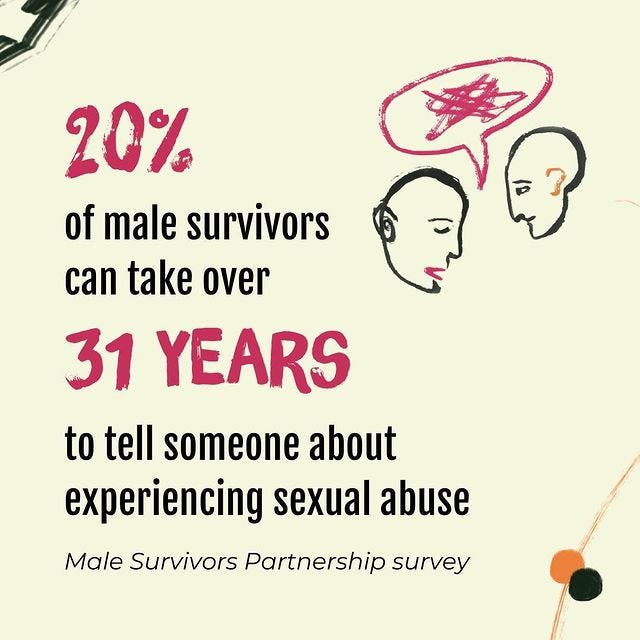Child Abuse and Mental Health Survivors Information - Issue #137
May is Mental Health Awareness Month - Which is Complicated
I know that for many in the mental health advocacy community, Mental Health Awareness campaigns elicit mixed feelings, at best.
Encouraging people to speak up and seek help is challenging when we know many will not receive it. The resources don’t exist.
On the other hand, the work of lobbying and advocating for those resources benefits from having more people involved, which can be a benefit of more people talking about mental health.
So, I acknowledge the problem of not having enough resources while also acknowledging that we need more voices to get loud until we have better resources.
Thank you for reading the Child Abuse and Mental Health Survivors newsletter. Each week, I share new blog posts and other resources that aim to help survivors of childhood abuse and those who are struggling with mental health issues feel less alone as we discuss the issues surrounding our issues.
For more information about me and why this newsletter exists, visit the website - Child Abuse Survivor.
So, with that in mind, and this being the first newsletter for May of 2024, I have some links about Mental Health Awareness Month:
It’s Okay to Not Be Okay: Tips and Resources for Mental Health Awareness Month
Mental Health Awareness Campaigns: How to Make an Impact Now
New from the Blogs
When Self-Improvement Turns Into Misery
Seeking to improve ourselves to catch up on some deficiencies that we believe we have will be a neverending proposition. It will lead to misery because it starts with feeling inferior.
You're not. Now, go better yourself because you want to be better. Not because you have to catch up.
Linked - A Business Case for Building Empathy, Trust, and Psychological Safety
What I would like, however, is just once for someone not to feel the need to make a business case for treating your employees with kindness and empathy. This need to include the business case and the impact on the bottom line is an appeal to management in their self-interest and the financial interest of their business.
How about we make the case that being kind, thoughtful, and empathetic towards employees is the right way to treat a fellow human being, regardless of what it means for the bottom line? Is it too much to ask managers and CEOs to treat people like people? Or are we so far down the caste system at work that we have to convince managers to act as if they care about their employees to benefit themselves?
Sharing - Positive Childhood Experiences Protect Against Depression in Teens
I have often said the best defense against childhood sexual abuse is raising kids who have open, supportive adults in their lives because they aren't as vulnerable and easily manipulated. It turns out those same relationships are improving their mental well-being, too. Let's do more of that.
Shared from Elsewhere
What would you say to your younger self dealing with depression? - Kristen Bell's advice to her younger self about depression is a must hear for everyone.
Always good to have lists like this to share - 12 Self-Help Books That Are Actually Helpful for BIPOC Folks.
Indeed, this needs to be a conversation. I grew up with no idea how to feel about sexual intimacy. I could have benefitted from some honest conversation - Let’s Talk About Sex and Intimacy After Surviving Sexual Abuse.
This is also something I wish I knew going into therapy - How to Talk to a Therapist about Depression.
From the Archives
What We Wish Parents Understood
The second thing was that so many of the things your kids need when you find out they've been abused are the same things that adult survivors need as well. We need to be believed, we need to feel safe, we need to know that we are worthy of protection, and we need to be heard. Those things are a big part of healing, no matter how old we are now.
Quick Thought Number 8 – An Example of Stigma and When We Can’t Be Open
For many people, who may be applying to college, or for a job, or who work in fields that would carry a lot of stigma around the issue, it’s not always safe to speak openly about their mental health struggles.
This is why those of us who can, need to, and it’s why when someone does speak openly about it, we must be willing to share those voices.
Quick Thought #19 – Loneliness and Toxic Positivity
I think the real damage social media has done is to make toxic positivity popular. For every person celebrating their “good vibes only” lifestyle, there are at least 2-3 people who have lost a friend because they’ve been cut out by someone unwilling to be with them in their pain.
Thanks for reading. If you find this newsletter informative and helpful, spread the word. That’s the best way to say thank you for my weekly effort.




